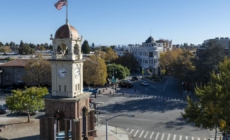-
Here’s why Santa Cruz just added a soda tax, in defiance of a statewide ban - 17 mins ago
-
Los Angeles Lakers eliminated — What went wrong vs Minnesota Timberwolves? | Speak - 23 mins ago
-
Navy vet sentenced for killing wife, setting home on fire with baby inside due to open relationship - 30 mins ago
-
How to Watch Stars vs Avalanche Game 6: Live Stream NHL Playoffs, TV Channel - 36 mins ago
-
LA Marathon will move its 2026 race date to accommodate the Oscars - 56 mins ago
-
Sammy Hagar blasts David Lee Roth for disappointing Van Halen fans - about 1 hour ago
-
Nebraska lands commitment from elite 2027 QB prospect Trae Taylor - about 1 hour ago
-
Army’s Massive Washington Parade for Trump’s Birthday Includes Plan for 6,600 Troops - about 1 hour ago
-
Newly single mom disappears and is presumed dead - about 1 hour ago
-
High-speed rail leaders sound alarm over train’s financial future - 2 hours ago
AI-powered cameras gave out nearly 10,000 tickets along L.A. bus routes
In a one-month period, artificial-intelligence-assisted cameras mounted on Los Angeles Metro buses generated nearly 10,000 citations for parking violations, according to the Los Angeles Department of Transportation.
Cameras were first installed on the windshields of some Metro buses last year, but the first tickets were issued in mid-February. Initially, the only buses to have cameras were along line 212, from Hollywood/Vine to Hawthorne/Lennox stations via La Brea Avenue, and line 720, from Santa Monica to downtown L.A. via Wilshire Boulevard. Line 70, which services Olive Street and Grand Avenue, and lines 910 and 950 that serve Metro’s J Line have since been included.
The AI-powered cameras scan for illegally parked cars and compile a video of each violation, a photo of the license plate and the time and location, according to the Los Angeles County Metropolitan Transportation Authority. Each citation is reviewed by a human.
At a minimum of $293 per violation, there’s nothing artificial about the ticket’s price tag.
In the second half of March, the program gave out 3,093 citations over cars blocking bus lanes or stops. That number more than doubled in the first two weeks of April, when 6,681 citations were issued.
Before the cameras were installed, officers typically issued around 570 tickets for impeding bus lanes monthly, the transportation department told LAist.
“Without enforcement, a single parked car in a bus lane can delay dozens or even hundreds of riders. So, this is not just about issuing tickets, it’s about making sure our Metro buses run on schedule and get our riders to their destinations on time,” said Metro Board Chair and L.A. County Supervisor Janice Hahn.
The program, designed by technology company Hayden AI, is meant to improve bus times, increase ridership and address mobility concerns. Metro’s board of directors approved an $11-million contract with the company last year to roll out 100 camera systems. The agreement started in December and is supposed to last roughly five years.
Although the AI-powered security cameras constantly scan for illegally parked cars, Charles Territo, Hayden AI’s chief growth officer, said the technology is trained to record only when a potential violation is observed.
“If the bus is moving and there’s no vehicle parked in the lane, it’s not recording any data,” he said. “Only when the system observes a vehicle parked illegally in a bus lane or a bus stop does it record the license plate and capture video of the event.”
Similar programs are being used in Washington, D.C., and New York City as the use of AI continues to expand for travel safety.
Recently, Southern California’s regional rail system Metrolink was granted $1.3 million to develop an AI-powered security system to detect unexpected movement on the tracks.
Times staff writer Colleen Shalby contributed to this report.
Source link





























